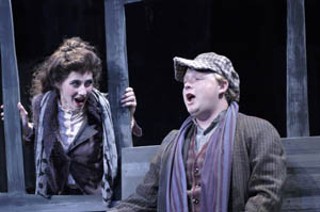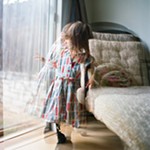One Holiday, Two Gifts, 100 Years
Dan Welcher's pair of Yuletide operas shows what a difference a century makes
By Robert Faires, Fri., April 22, 2005

The bluebonnets are in bloom, shorts are the trousers of choice, and young men's fancies are turned to thoughts of love. It's spring in Austin, but in one small corner of the city, the mistletoe is hung, carolers are singing, and presents have been placed under the tree. In the McCullough Theatre on the UT campus, it's Christmas. Two Christmases, actually. UT Opera Theatre is presenting a pair of operas by Austin composer Dan Welcher, both set during the Yuletide season. The first, Della's Gift, is an adaptation of the beloved O. Henry story "The Gift of the Magi," developed by Welcher and librettist Paul Woodruff (better known as the director of UT's Plan II honors program) and staged here once before. Now, it's being paired with a new opera, Holy Night, also created with Woodruff and set in the same New York City apartment as Della's Gift but 100 years later, when two men occupy the room, and their love for and life commitment to each other causes tension among their respective families during a holiday visit.
Time warps in curious ways around these works. Audiences who see them together will be able to cross 100 years in fewer than 20 minutes, but that same journey took Welcher almost 20 years. When he started Della's Gift in 1986, he was simply stretching his wings as a composer, trying his hand at an art form that he felt suited his gifts for dramatic presentation and theatricality. He would have attempted an opera sooner, had anyone commissioned one from him, but his body of work – more than 20 pieces for orchestra at the time – worked against him on that score. "So I decided I'd just do it myself," Welcher says, "get one short operatic piece out there and see what it led to. And I picked 'The Gift of the Magi' because it was the Sesquicentennial year [for Texas] that particular year, 1986, and I approached Paul Woodruff to turn this little three-page story into an hourlong opera with eight characters, which he proceeded to do."
The opera's premiere at UT in February of 1987 was well-received (John Ardoin wrote in the Dallas Morning News that Welcher had "constructed a musical aura that evokes a bygone American era in a gently loving way."), but beyond a few productions at other schools and a 2002 staging by New York City Opera, Della's Gift never won much of a place in the operatic repertoire. The reason, as it was explained repeatedly to Welcher, wasn't the music; it was the length. The brevity that Welcher used to get his first opera out there quickly was the very thing that kept his opera from staying out there. "It was never enough to have an evening to itself, and that was the problem. All the opera producers told me that. They said, 'We have to find something to pair with it. It would be much better if there were something by you to pair with it.' Which is how I wound up doing the second piece.'"
Getting to that point took a long time, however, largely because Welcher had promised himself that he wouldn't write another opera "on spec," as he had done with Della's Gift. "But the bug bit hard," he concedes. "I just loved the experience of writing that first opera and watching it come to life, and I thought, 'Well, okay, no one is going to do this for me, why don't I do the other piece?' The people at New York City Opera were very encouraging when Della's Gift was done there. They said, 'If you can flesh this out to a whole evening by adding another piece of yours, especially if it doesn't involve multiple sets, then we can better think about a production.' And that's what got me thinking, well, instead of looking for another O. Henry story or another short story per se, why not come up with something that can reuse these same two sets? And that's when Paul Woodruff came up with the idea of moving the action forward 100 years and reimagining Christmas Eve with all new people in the same apartment."
Welcher allows that the idea of recycling sets from the first opera as the springboard for a second sounds "really banal," but in a sense he and Woodruff are just staying in step with the good gentleman whose story they adapted 19 years ago. "O. Henry's first step in 'Gift of the Magi' was imagining a horsehair sofa in the middle of a shabby living room. He used to prompt his imagination that way – Stephen Sondheim does this, too – by imagining an object and creating a situation. Our object was the set."

The situation suggested by Woodruff was a gay relationship, which Welcher initially rejected out of a concern that opera companies might find the subject objectionable. "But the more we refined it," the composer says, "the more we realized that if we don't turn this into a show about lust, (but instead) turn this into a show about love, commitment, and relationships, it could be very powerful. And also G-rated, which it is. There's absolutely nothing on stage or in the libretto that you couldn't show to a 2-year-old. It's just another kind of family, another kind of love, and another kind of dilemma. In 'Gift of the Magi,' the tension is from poverty. Della and Jim have absolutely no money. They're not even able to pay the rent. They can't eat. They're starving. That's the dilemma for them, and the beauty of the love story comes out of the willingness to sacrifice the one thing they do own for the sake of the other person. But 100 years later, this part of New York is now yuppified. It's the Lower East Side. You wouldn't see poor people living in that same apartment. You'd see a yuppie couple of some sort, probably. And that's where we started to reimagine what sort of family, what sort of problem (would be there). In this case, one of the two men has been disowned and the other is smothered, but neither is being accepted quite the way he thinks he should be."
The shift in time for the new opera also necessitated a shift in sound. With Della's Gift, Welcher had drawn heavily on the popular music of 1905, quoting such chart-toppers of the day as "Bird in a Gilded Cage," "In the Good Old Summertime." and "Hello My Baby, Hello My Honey, Hello My Ragtime Gal," and he sweetened the score with a sort of nostalgic air suited to that era of Americana. Obviously, such a soundtrack wouldn't fit in the Fifth Avenue apartment of 2005, but what would? Simply plugging in samples from this year's Billboard Top 100? As the story took shape, Welcher chose not to quote any contemporary music at all, but to base the work on seasonal carols, binding the opera together with elements of the song from which the opera takes its title, "O Holy Night." The result is a score less rooted in a specific time than its companion but one that still evokes this modern world in its somewhat darker sound.
Still, as the love expressed in both operas is recognizably the same, despite the difference in setting, so is the source of the music. "I would say that if you heard these two pieces back to back and didn't know, you would still guess they were by the same composer," Welcher says. "It's still my language. Both pieces are tonal. Both pieces have key signatures all the way through. And both pieces are constructed like a Richard Strauss opera in that there are leitmotifs that identify different people and different ideas. For instance, in Holy Night, the most important leitmotif is the ring. The two men are buying commitment rings for each other, and Joshua explains to Dennis that he saw children playing in a park and they were all running around like little individual dervishes until suddenly they began to join hands and made this one big ring. And he makes the metaphor that this is how he sees the commitment ring that they are buying for each other, that all children are safe within a curve that never ends. That becomes a leitmotif that propels us through the whole opera and in fact blesses the opera at the end."
That should offer a sense of the strong emotional quality of Welcher's latest. That's deliberate on the composer's part; he relishes being able "to take an audience and push it in different directions emotionally" in opera. Still, it can wring out as much feeling from him as from his audience. He wrote the second scene of Holy Night during a three-week stay at the MacDowell Colony, and he says he spent "at least an hour a day crying, because the emotions I was writing were so close to the bone. And it's universal. These are all feelings everybody's had: 'You don't care that much about me,' 'You're abandoning me' – all the things that sound trivial and cliché-ridden when you see them in print but when they happen to you aren't that way at all. And I managed to work myself into quite a sweat for three weeks working on this piece."
And that's a good thing in Welcher's book, a good thing and the key thing. "To me, if it doesn't do it to the composer, it's not going to do it to anybody else. You have to get in there and fight your own demons and feel it your own way, as an actor does, before you can translate it to an audience."
For only the second time in his career, Dan Welcher has gotten in there and fought his way out for the sake of an opera. But if he had his way, he'd gladly do it again – and without waiting another 20 years for the third opportunity. "It's one thing to write a serious string quartet and have people out in the audience scratch their heads and rub their chins and think deep thoughts. It's quite another to conduct a 70-minute opera, turn around at the end, and see everybody sniffling into a handkerchief. Of those two experiences, I prefer the second one. I really love the idea of moving people: making them laugh, making them cry – real honest involvement with the stage. It's just who I am. I think my better orchestral and chamber works do that, too, but not on the level that opera does."
Memo to Santa: Now you know what kind of commission to leave in Dan's stocking this Christmas. ![]()
Della's Gift and Holy Night will be performed Friday, April 22 & 29, 8pm, and Sunday, April 24 & May 1, 7pm, in the McCullough Theatre on the UT campus. For more information, call 471-1444.








